Search the Special Collections and Archives Portal
Search Results
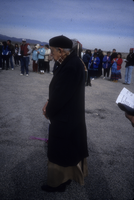
Dom Hélder Câmara and unidentified protestors at the Nevada Test Site: photographic slide
Date
Archival Collection
Description
From the Sister Klaryta Antoszewska Photograph Collection (PH-00352). Dom Hélder Câmara was the Archbishop of Brazil.
Image
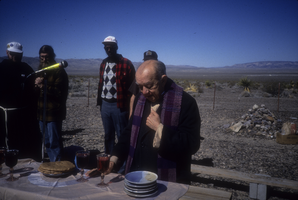
Dom Hélder Câmara and unidentified protestors at the Nevada Test Site: photographic slide
Date
Archival Collection
Description
From the Sister Klaryta Antoszewska Photograph Collection (PH-00352). Dom Hélder Câmara was the Archbishop of Brazil.
Image
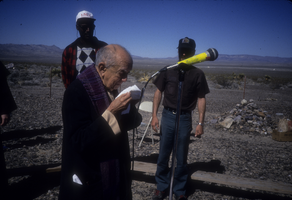
Dom Hélder Câmara and unidentified protestors at the Nevada Test Site: photographic slide
Date
Archival Collection
Description
From the Sister Klaryta Antoszewska Photograph Collection (PH-00352). Dom Hélder Câmara was the Archbishop of Brazil.
Image
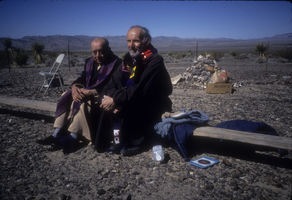
Dom Hélder Câmara and Louis Vitale (identified from left to right) at the Nevada Test Site: photographic slide
Date
Archival Collection
Description
From the Sister Klaryta Antoszewska Photograph Collection (PH-00352). Dom Hélder Câmara was the Archbishop of Brazil. Louis Vitale was a member of the Order of Firars Minor (O.F.M.).
Image
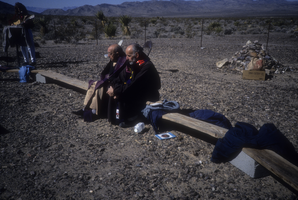
Dom Hélder Câmara and Louis Vitale (identified from left to right) at the Nevada Test Site: photographic slide
Date
Archival Collection
Description
From the Sister Klaryta Antoszewska Photograph Collection (PH-00352). Dom Hélder Câmara was the Archbishop of Brazil. Louis Vitale was a member of the Order of Firars Minor (O.F.M.).
Image
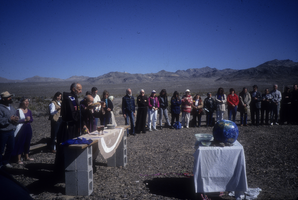
Louis Vitale, Dom Hélder Câmara, and numerous unidentified protestors at the Nevada Test Site: photographic slide
Date
Archival Collection
Description
From the Sister Klaryta Antoszewska Photograph Collection (PH-00352). Dom Hélder Câmara (behind the right side of the altar) was the Archbishop of Brazil. Louis Vitale (behind the left side of the altar) was a member of the Order of Friars Minor (O.F.M.).
Image
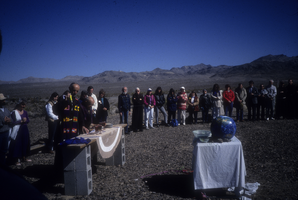
Louis Vitale, Dom Hélder Câmara, and numerous unidentified protestors at the Nevada Test Site: photographic slide
Date
Archival Collection
Description
From the Sister Klaryta Antoszewska Photograph Collection (PH-00352). Dom Hélder Câmara (behind the right side of the altar) was the Archbishop of Brazil. Louis Vitale (behind the left side of the altar) was a member of the Order of Friars Minor (O.F.M.).
Image
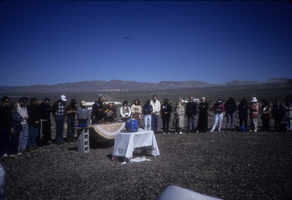
Louis Vitale, Dom Hélder Câmara, and numerous unidentified protestors at the Nevada Test Site: photographic slide
Date
Archival Collection
Description
From the Sister Klaryta Antoszewska Photograph Collection (PH-00352). Dom Hélder Câmara (behind the right side of the altar) was the Archbishop of Brazil. Louis Vitale (behind the left side of the altar) was a member of the Order of Friars Minor (O.F.M.).
Image

Dom Hélder Câmara and unidentified protestors at the Nevada Test Site: photographic slide
Date
Archival Collection
Description
From the Sister Klaryta Antoszewska Photograph Collection (PH-00352). Dom Hélder Câmara (right) was the Archbishop of Brazil. Lenten Desert Experience.
Image
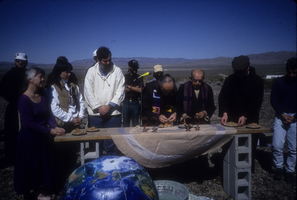
Louis Vitale, Dom Hélder Câmara, and numerous unidentified protestors at the Nevada Test Site: photographic slide
Date
Archival Collection
Description
From the Sister Klaryta Antoszewska Photograph Collection (PH-00352). Dom Hélder Câmara (third from the right) was the Archbishop of Brazil. Louis Vitale (fourth from the right) was a member of the Order of Friars Minor (O.F.M.).
Image
